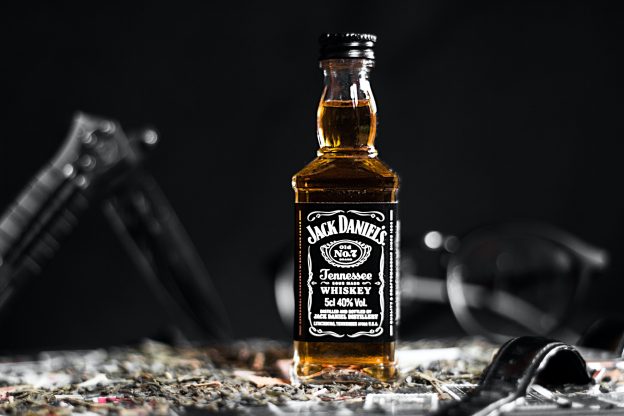Tristan Clapham – A poop-themed dog toy resembling a Jack Daniel’s bottle will test the limits of parody and First Amendment protections in trademark infringement cases. The Supreme Court is set to decide Jack Daniels Properties v. VIP Products during this term, where the famed whiskey distiller aims to enjoin a dog toy manufacturer from producing its “Bad Spaniels” toy.
The dog toy at issue is square shaped like a Jack Daniel’s bottle and features a label with a similar shape, font, and style of the whiskey brand. However, the text of the label features humorous poop-themed quips—it reads “Bad Spaniels, the Old No. 2 On Your Tennessee Carpet.” Rather than being “40% alcohol by volume,” Bad Spaniels claims to be “43% poo by volume” and “100% smelly.” The toy also contains a tag stating that it is not affiliated with the Jack Daniel’s distillery.
Jack Daniel’s sued VIP Products (VIP) over the parody product,asserting trademark infringement and dilution by tarnishment. Generally, a trademark infringement analysis centers on whether customers are likely to be confused as to the source of the product (e.g., who makes the product at issue). Dilution by tarnishment focuses on whether a famous trademark is improperly associated with an inferior or offensive product. However, parody is a defense to both asserted causes of action. The parody defense is rooted in the First Amendment and interests of free expression. Courts must often balance free speech concerns against interests of trademark law when considering whether a parodied product causes consumer confusion.
The Supreme Court is hearing this case on appeal from the Ninth Circuit. While the trial court ruled in favor of Jack Daniels, the Ninth Circuit reversed in favor of VIP, holding that there was no trademark infringement or dilution. The Ninth Circuit reasoned that there was no trademark infringement based on its application of the Rogers test, which courts use to balance free speech and trademark concerns. The Rogers test permits uses of trademarks in expressive works where the trademark’s use has artistic relevance and does not mislead as to the source of the work. Here, the court held that Bad Spaniels was an expressive work because it transformed Jack Daniel’s trademark to convey a humorous message. The court held that there was no trademark dilution because the use of Jack Daniel’s mark was noncommercial. Even though VIP used the trademarks at issue to sell products, the humorous message on the dog toy made use of the mark noncommercial.
The Supreme Court recently decided in favor of free speech in two cases regarding the eligibility of certain trademarks to be federally registered. In 2017, the Supreme Court eliminated the prohibition on registering trademarks that disparage members of a racial or ethnic group. In line with its 2017 ruling, in 2019 the Supreme Court struck down a similar provision that prevented registration of “immoral of scandalous” trademarks. In both cases, the First Amendment was the driving force behind the Court’s holding that the provisions at issue were unconstitutional. This recent precedent may suggest that the Supreme Court will side with VIP and err in favor of protecting speech.
The Supreme Court’s ruling in this case will shape future trademark disputes by clarifying the extent that the parody defense can reach to protect those who poke humorous fun at other trademarks. A particularly important issue to monitor is how the Court will react to the Ninth Circuit’s reasoning that VIP’s use of Jack Daniel’s trademark is noncommercial. It seems counterintuitive to hold that VIP’s use of the mark is noncommercial when VIP is selling the Bad Spaniels toy. However, a ruling in favor of Jack Daniel’s runs the risk of significantly curtailing First Amendment protections. Trademark law aims to prevent consumer confusion; it seems unlikely that consumers would think that Jack Daniel’s was the source of a poop-themed dog toy. Holding so would expand trademark law beyond its intended scope and interfere with First Amendment rights. Holding for Jack Daniel’s would also make parodying much more challenging for artists and other creatives; it would increase the risk of litigation from large brands whose trademarks are parodied in ways they do not like.
Whether the Supreme Court decides to allow commercialized parodies (in the layman’s sense), reverse the Rogers test entirely, or fall somewhere in between, the implications that a poop-themed joke may have on trademark law are no laughing matter.


